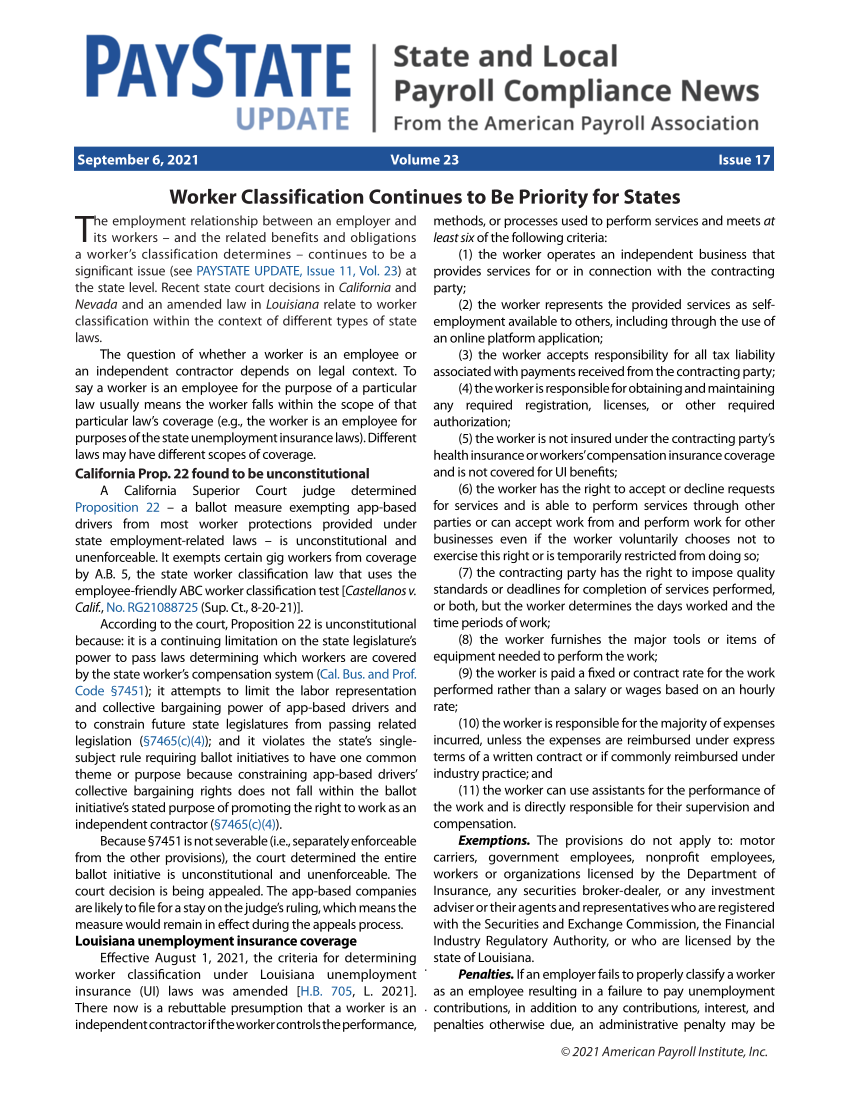© 2021 American Payroll Institute, Inc. Worker Classification Continues to Be Priority for States The employment relationship between an employer and its workers – and the related benefits and obligations a worker’s classification determines – continues to be a significant issue (see PAYSTATE UPDATE, Issue 11, Vol. 23) at the state level. Recent state court decisions in California and Nevada and an amended law in Louisiana relate to worker classification within the context of different types of state laws. The question of whether a worker is an employee or an independent contractor depends on legal context. To say a worker is an employee for the purpose of a particular law usually means the worker falls within the scope of that particular law’s coverage (e.g., the worker is an employee for purposes of the state unemployment insurance laws). Different laws may have different scopes of coverage. California Prop. 22 found to be unconstitutional A California Superior Court judge determined Proposition 22 – a ballot measure exempting app-based drivers from most worker protections provided under state employment-related laws – is unconstitutional and unenforceable. It exempts certain gig workers from coverage by A.B. 5, the state worker classification law that uses the employee-friendly ABC worker classification test [Castellanos v. Calif., No. RG21088725 (Sup. Ct., 8-20-21)]. According to the court, Proposition 22 is unconstitutional because: it is a continuing limitation on the state legislature’s power to pass laws determining which workers are covered by the state worker’s compensation system (Cal. Bus. and Prof. Code §7451) it attempts to limit the labor representation and collective bargaining power of app-based drivers and to constrain future state legislatures from passing related legislation (§7465(c)(4)) and it violates the state’s single- subject rule requiring ballot initiatives to have one common theme or purpose because constraining app-based drivers’ collective bargaining rights does not fall within the ballot initiative’s stated purpose of promoting the right to work as an independent contractor (§7465(c)(4)). Because §7451 is not severable (i.e., separately enforceable from the other provisions), the court determined the entire ballot initiative is unconstitutional and unenforceable. The court decision is being appealed. The app-based companies are likely to file for a stay on the judge’s ruling, which means the measure would remain in effect during the appeals process. Louisiana unemployment insurance coverage Effective August 1, 2021, the criteria for determining worker classification under Louisiana unemployment insurance (UI) laws was amended [H.B. 705, L. 2021]. There now is a rebuttable presumption that a worker is an independent contractor if the worker controls the performance, methods, or processes used to perform services and meets at least six of the following criteria: (1) the worker operates an independent business that provides services for or in connection with the contracting party (2) the worker represents the provided services as self- employment available to others, including through the use of an online platform application (3) the worker accepts responsibility for all tax liability associated with payments received from the contracting party (4) the worker is responsible for obtaining and maintaining any required registration, licenses, or other required authorization (5) the worker is not insured under the contracting party’s health insurance or workers’ compensation insurance coverage and is not covered for UI benefits (6) the worker has the right to accept or decline requests for services and is able to perform services through other parties or can accept work from and perform work for other businesses even if the worker voluntarily chooses not to exercise this right or is temporarily restricted from doing so (7) the contracting party has the right to impose quality standards or deadlines for completion of services performed, or both, but the worker determines the days worked and the time periods of work (8) the worker furnishes the major tools or items of equipment needed to perform the work (9) the worker is paid a fixed or contract rate for the work performed rather than a salary or wages based on an hourly rate (10) the worker is responsible for the majority of expenses incurred, unless the expenses are reimbursed under express terms of a written contract or if commonly reimbursed under industry practice and (11) the worker can use assistants for the performance of the work and is directly responsible for their supervision and compensation. Exemptions. The provisions do not apply to: motor carriers, government employees, nonprofit employees, workers or organizations licensed by the Department of Insurance, any securities broker-dealer, or any investment adviser or their agents and representatives who are registered with the Securities and Exchange Commission, the Financial Industry Regulatory Authority, or who are licensed by the state of Louisiana. Penalties. If an employer fails to properly classify a worker as an employee resulting in a failure to pay unemployment contributions, in addition to any contributions, interest, and penalties otherwise due, an administrative penalty may be September 6, 2021 Volume 23 Issue 17
Printed for: PayrollOrg Bookshelf © 2024 American Payroll Institute, Inc. All Rights reserved. From: PayrollOrg Digital Publications (bookshelf.payroll.org)






